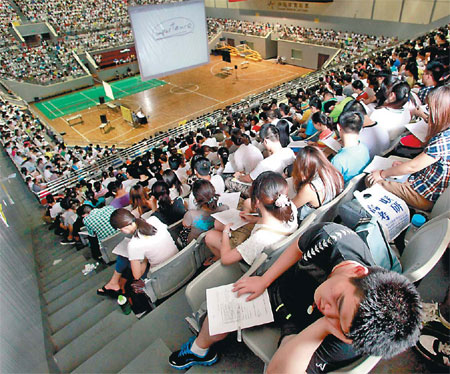
|
 |
|
A student naps during a lecture about the entrance examination for postgraduates at Huangting Gymnasium in Jinan, Shandong province, on Sunday. More than 3,500 students attended the lecture. [Photo/China Daily] |
Zhang Hui has been struggling to find work for months but has been unable to turn her luck around in the job market.
A graduate with a master's degree from Shanghai International Studies University, the 24-year-old felt lost at sea after setting sail on the journey of her life.
"You have no idea how hard I tried to get a job," Zhang said. "It's really been a grueling summer for me."
Zhang is not the only one to find herself stuck without a job after obtaining a master's degrees.
Since 2009, graduates with master's degrees have seen their rate of employment decline. Holders of the degrees were employed at a lower rate than undergraduates, according to a Survey of Nationwide University Graduates Employment from 2009 to 2010, which was conducted by Peking University and the Ministry of Education.
"Why should we go to graduate school then?" Zhang said.
"I remember it being much easier to find a job three years ago, when I finished my undergraduate studies."
She said her friends who had gone straight to work from college were doing well.
Three years ago, Zhang had received an offer to work in the Shanghai media industry. That opportunity vanished, though, after she had a master's degree.
"I don't understand," Zhang said. "I am still the same person, only with more experience and a better degree. So why am I less employable?"
Zhao Yuehua, director of China University Students Career Guide, a biweekly journal published by the Ministry of Education, offered an explanation.
"This is a social change that has resulted from the demands and needs of our society," Zhao said. "The number of jobs that are available is increasing, but more students are being admitted (to graduate programs) as well."
The Ministry of Education said universities and similar institutions plan to recruit 584,000 graduate students in 2012, including 517,000 for master's degrees. In 2003, the number was 269,000, including 220,000 students pursuing master's degrees.
A retired associate professor specializing in aesthetics at University of Science and Technology Beijing, who declined to provide her full name, said graduate students have become far more common in the past 10 years.
Although poor health has driven her to retire from her full-time position, the professor still works with two master students.
"The number of students in our department is skyrocketing and sometimes one faculty member has to help many students," she said.
The professor said faculty members are overworked at times and pay less attention to students as a result.
"It puts the quality of education in danger," she said.
She said it's important that students in graduate-level courses study subjects tailored to their interests and even more important that they receive guidance from advisers.
"That's the reason for attending graduate school - it gives you an opportunity to talk to advisers individually instead of sitting in a lecture hall," she said.
"There are two reasons that more people are pursuing graduate degrees," Zhao said.
"First of all, if it's becoming more difficult for college graduates to find work, then they are looking to go to graduate school to postpone the pressure of job hunting."
Zhao also said more employers are requiring their employees to have graduate degrees.
"It puts schools in the difficult situation of having to deal with a flood of graduate students all of a sudden," Zhao said.
Zhao had some advice for students who are thinking about attending graduate school.
"It is important for graduate students to look up from their the textbooks and see the needs of society and get ready for them."


 Washington to remain focused on Asia-Pacific
Washington to remain focused on Asia-Pacific RQFII target blue chips amid bear market
RQFII target blue chips amid bear market Australian recall for top two exporters
Australian recall for top two exporters China fears new car restrictions
China fears new car restrictions